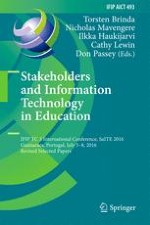2016 | Book
Stakeholders and Information Technology in Education
IFIP TC 3 International Conference, SaITE 2016, Guimarães, Portugal, July 5-8, 2016, Revised Selected Papers
Editors: Torsten Brinda, Nicholas Mavengere, Ilkka Haukijärvi, Cathy Lewin, Don Passey
Publisher: Springer International Publishing
Book Series : IFIP Advances in Information and Communication Technology
